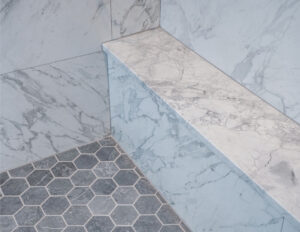How to Choose a Toilet (Without Flushing Your Sanity Down the Drain)
Let’s be real: nobody wants to spend their weekend obsessing over toilets. But here we are—because picking the wrong one can turn your bathroom into a daily nightmare. (Trust us, we’ve seen the aftermath of “budget-friendly” toilets that clog more than a ’90s dial-up connection.) At Verified Builders, Denver’s go-to home remodeling company, we’ve installed enough thrones to know what works, what flops, and what’ll make your bathroom the envy of your next dinner party. So grab a coffee, and let’s tackle this porcelain puzzle together.
Step 1: Know Your Toilet Types (Yes, There’s More Than One)
Toilets aren’t just “toilets.” They’re like cars: some are built for speed, others for comfort, and a few… well, let’s just say they belong in a museum. Here’s the lowdown:
One-Piece vs. Two-Piece
- One-piece toilets: Sleek, modern, and way easier to clean (no nooks for dust bunnies). Perfect for luxury home renovations where style matters.
- Two-piece toilets: Classic, affordable, and easier to transport. Ideal for basement contractors tackling tight spaces or budget-friendly updates.
Wall-Mounted vs. Floor-Mounted
- Wall-mounted: Space-savers that scream “contemporary chic.” Great for interior remodeling projects aiming for a minimalist vibe.
- Floor-mounted: The OG. Sturdy, reliable, and easier to install. A staple for whole home remodeling where practicality rules.
Pro Tip: If you’re working with Verified Builders on custom home remodeling, ask about smart toilets. Heated seats? Auto-flush? They’re the Teslas of bathrooms.
Step 2: Flush Performance Matters (No One Wants a Second Flush)
Ever had to do the “toilet tango”—flushing repeatedly while praying to the plumbing gods? Yeah, let’s avoid that.
Gravity-Flush vs. Pressure-Assisted
- Gravity-flush: Quiet, simple, and low-maintenance. Uses… well, gravity. Think of it as the Honda Accord of toilets.
- Pressure-assisted: Loud but mighty. Perfect for households where someone’s obsessed with “flush power.” (We won’t name names.)
Bold Takeaway: Always check the MaP score (Maximum Performance Testing). A score above 800 means it can handle last night’s chili.
Step 3: Size & Fit (Because Math Does Exist)
Measuring your bathroom isn’t glamorous, but neither is buying a toilet that doesn’t fit. Here’s the cheat sheet:
| Measurement | Why It Matters |
|---|---|
| Rough-In | Distance from wall to drainpipe (usually 12″). Wrong size = plumbing disaster. |
| Bowl Height | Standard (14–15″) vs. Comfort Height (16–19″). Your knees will thank you later. |
| Bowl Shape | Round (compact) vs. Elongated (roomier). Choose based on space and tush size. |
FYI: If you’re pairing this with kitchen remodeling services, coordinate finishes! Brushed nickel handles in the kitchen and chrome in the bathroom? Cringe.
Step 4: Water Efficiency (Save the Planet and Your Wallet)
Old toilets are water hogs (RIP 5-gallon flushes). Modern ones use 1.28 GPF (gallons per flush) or less. But—don’t sacrifice power for efficiency. Verified Builders’ design build construction team swears by dual-flush models: light flush for liquids, turbo flush for… the rest.
Step 5: Style & Finish (It’s Okay to Be Shallow Sometimes)
Your toilet should match your vibe. Glossy white? Classic. Matte black? Bold. Brushed gold? Look, we don’t judge.
Hidden vs. Exposed Tanks
- Hidden tanks: Sleek for home addition contractors creating spa-like ensuites.
- Exposed tanks: Easier to repair. Because someone will drop a LEGO in there eventually.
Common Toilet-Buying Mistakes (Learn From Others’ Regrets)
- Ignoring rough-in measurements. Spoiler: It’s not a DIY fix.
- Choosing style over function. That crystal-encrusted seat won’t unclog itself.
- Skipping professional installation. Unless you enjoy water damage.
Need Help? Verified Builders offers home restoration and plumbing services. We’ll handle the dirty work—literally.
FAQs: Your Toilet Queries, Answered
Q: How much does a toilet cost?
A: Between $100 (basic) and $2,500+ (smart models). For luxury home renovations, splurge on bidets with heated seats.
Q: Can I install it myself?
A: Sure, if you enjoy YouTube tutorials and existential crises. For guaranteed results, call Verified Builders. We’re local (near me!), licensed, and bring coffee.
Q: What’s the best toilet for a small bathroom?
A: Wall-mounted or compact round-front. Pair with interior remodeling hacks like floating vanities.
Q: How long do toilets last?
A: 15–30 years. But if yours predates Friends, it’s time for an upgrade.
Final Flush (See What We Did There?)
Choosing a toilet isn’t rocket science, but it’s easy to overthink. Stick to your budget, measure twice, and prioritize performance over Pinterest trends. And hey, if you’re juggling home renovation company options in Denver, give Verified Builders a shout. We’re not just toilet whisperers—we handle whole home remodeling, basement contractors, and yes, even kitchen remodeling services. Because nothing says “adulting” like a bathroom that doesn’t embarrass you when guests come over.
Ready to upgrade? Let’s turn your throne into a masterpiece. (Or at least stop it from running all night.) 😉


